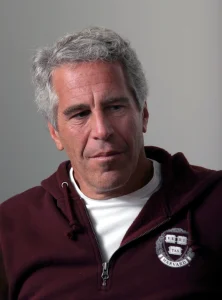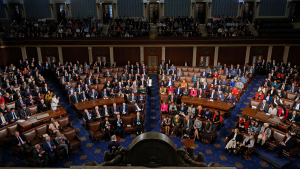California’s upcoming gubernatorial race is heating up, and one of the newest entrants, Representative Eric Swalwell, D-Calif., is advocating for a bold modernization of the state’s voting system. In his first television news interview since officially launching his campaign, Swalwell proposed that Californians should have the ability to vote using their phones in elections, arguing that the state must embrace technology to improve voter access.
“I want us to be able to vote by phone,” Swalwell told CNN’s Elex Michaelson in a Saturday interview. When Michaelson reacted with surprise, Swalwell elaborated, drawing a comparison to other aspects of modern life. “Yeah. If we can do our taxes, make our healthcare appointments, you know, essentially do your banking online, you should be able to vote by phone. Make it safe. Make it secure, but it’s actually already happening all over the United States,” he said.
Swalwell, who represents California in the U.S. House of Representatives, officially announced his gubernatorial campaign just days earlier on the late-night show Jimmy Kimmel Live!. His platform emphasizes not only accessibility in voting but also efficiency and accountability in government operations.
“Max Out Democracy”
The candidate’s remarks reflect a broader vision for what he calls “maxing out democracy” in California. He expressed frustration with the long wait times often experienced at polling places and suggested that counties should be held accountable if residents face delays. “If you wait in line for 30 minutes or more, if you do want to vote in person, I think you should fine every county for every minute that a person has to wait longer,” Swalwell said.
This proposal is part of Swalwell’s push to ensure that all Californians have equal access to the ballot, regardless of income, geography, or mobility limitations. It also aligns with his broader goal of using technology to modernize government services, including the state’s Department of Motor Vehicles. He hopes to eventually eliminate the need for in-person DMV visits, making appointments and license renewals fully digital.
The Case for Mobile Voting
Mobile voting, also referred to as online or app-based voting, has been piloted in several states across the U.S., though mostly in limited or experimental settings. West Virginia famously tested a mobile voting system in 2018, allowing overseas voters to cast ballots through a secure app during the midterm elections. Since then, the nonprofit Mobile Voting Project has expanded its efforts, launching 21 pilot programs across seven states, including Utah, Colorado, South Carolina, and Oregon.
Despite the technological potential, these programs have generally been restricted to certain counties or specific types of voters, such as military personnel and overseas residents. Critics argue that while the systems can increase accessibility, they also raise concerns about cybersecurity, voter privacy, and the integrity of the election process.
Swalwell, however, believes these challenges can be addressed with modern security measures. “Make it safe. Make it secure,” he said, emphasizing that a properly implemented system could allow Californians to vote as easily as they perform everyday online tasks like banking or booking appointments.
A Crowded Democratic Field
Swalwell is one of several Democratic candidates vying to become California governor in 2026. His opponents include former U.S. Secretary of Health and Human Services Xavier Becerra, former U.S. Representative Katie Porter, and billionaire activist and 2020 presidential candidate Tom Steyer. Each candidate brings a distinct set of policy priorities, and Swalwell’s focus on technology and voter access sets him apart from the rest of the field.
In his campaign, Swalwell has framed these reforms as part of a larger commitment to efficiency and modernization in California government. He has highlighted inefficiencies in state operations, particularly in agencies like the DMV, and argued that technology should be leveraged to simplify interactions between residents and government services.
Addressing the Challenges
Implementing mobile voting on a large scale is not without obstacles. Cybersecurity experts caution that any system must be rigorously tested and continuously updated to prevent hacking, fraud, or technical failures. Additionally, access to reliable internet and digital literacy can vary significantly across California, meaning any mobile voting initiative would need to ensure equitable access for all voters.
Swalwell acknowledges these concerns but maintains that the benefits outweigh the risks. “We’ve already seen pilots across multiple states, and technology has advanced rapidly,” he said. He emphasized that the goal is not to replace in-person voting entirely but to provide additional, convenient options for citizens who might otherwise face barriers to participating in elections.
Modernizing Government Services
Beyond voting reform, Swalwell’s campaign is focusing on broader modernization efforts across California government. He has expressed interest in streamlining bureaucratic processes, reducing unnecessary paperwork, and improving responsiveness to residents. For example, he hopes that state agencies could move more services online, from DMV appointments to healthcare scheduling, thereby reducing wait times and improving efficiency.
This digital-first approach is designed not only to make government more convenient but also to increase transparency and accountability. By providing citizens with digital access to services and records, Swalwell argues that Californians can be better informed and engaged with the workings of their state government.
A Vision for “Accessible Democracy”
At the core of Swalwell’s gubernatorial campaign is the idea of “accessible democracy.” He has repeatedly emphasized the need for California to be a model for the rest of the nation when it comes to voter participation. By combining mobile voting options with strict accountability measures for polling locations, he believes the state can set a new standard for how elections are conducted.
This vision extends beyond voting technology. Swalwell has suggested that long lines at polling stations should be treated as a serious failure of administration, with counties facing fines for each minute that voters are delayed. The goal, he said, is to ensure that every Californian, regardless of location or circumstance, can exercise their right to vote without undue burden.
Public Reaction
Swalwell’s proposals have elicited a range of reactions from both political commentators and the public. Supporters argue that modernizing voting systems is long overdue, especially given how many aspects of daily life have moved online. Critics, meanwhile, have raised concerns about cybersecurity and election integrity, cautioning that mobile voting could introduce new risks if not carefully implemented.
Regardless of the debate, Swalwell is positioning himself as a forward-thinking candidate who prioritizes accessibility, efficiency, and technological innovation. His campaign seeks to appeal to younger voters and tech-savvy residents who expect government services to keep pace with modern life.
Looking Ahead
As the California gubernatorial race continues to take shape, Swalwell’s proposals for mobile voting and shorter lines may become central issues in the campaign. Other candidates will likely respond with their own visions for election reform and government modernization, setting the stage for a competitive primary.
Swalwell’s approach represents a significant shift from traditional election administration, emphasizing convenience and efficiency without sacrificing security. By promoting these reforms, he hopes to increase voter turnout, reduce barriers to participation, and demonstrate that California can be a leader in accessible democracy.
Conclusion
Eric Swalwell’s gubernatorial campaign is centered on a vision of modern, accessible, and accountable government. By advocating for voting by phone, stricter accountability for polling lines, and broader digitization of state services, Swalwell is attempting to redefine what it means to participate in California democracy.
While mobile voting remains a controversial and technically challenging proposal, the candidate insists that secure, user-friendly technology can transform how citizens interact with the electoral process. Whether voters embrace these ideas will be a key question in the lead-up to the 2026 election, as Californians weigh the merits of innovation against concerns about security and fairness.
With a crowded Democratic field and a competitive Republican presence, Swalwell’s campaign is off to a bold start — seeking not only to win votes but to fundamentally rethink the way Californians access and exercise their democratic rights.

Emily Johnson is a critically acclaimed essayist and novelist known for her thought-provoking works centered on feminism, women’s rights, and modern relationships. Born and raised in Portland, Oregon, Emily grew up with a deep love of books, often spending her afternoons at her local library. She went on to study literature and gender studies at UCLA, where she became deeply involved in activism and began publishing essays in campus journals. Her debut essay collection, Voices Unbound, struck a chord with readers nationwide for its fearless exploration of gender dynamics, identity, and the challenges faced by women in contemporary society. Emily later transitioned into fiction, writing novels that balance compelling storytelling with social commentary. Her protagonists are often strong, multidimensional women navigating love, ambition, and the struggles of everyday life, making her a favorite among readers who crave authentic, relatable narratives. Critics praise her ability to merge personal intimacy with universal themes. Off the page, Emily is an advocate for women in publishing, leading workshops that encourage young female writers to embrace their voices. She lives in Seattle with her partner and two rescue cats, where she continues to write, teach, and inspire a new generation of storytellers.









